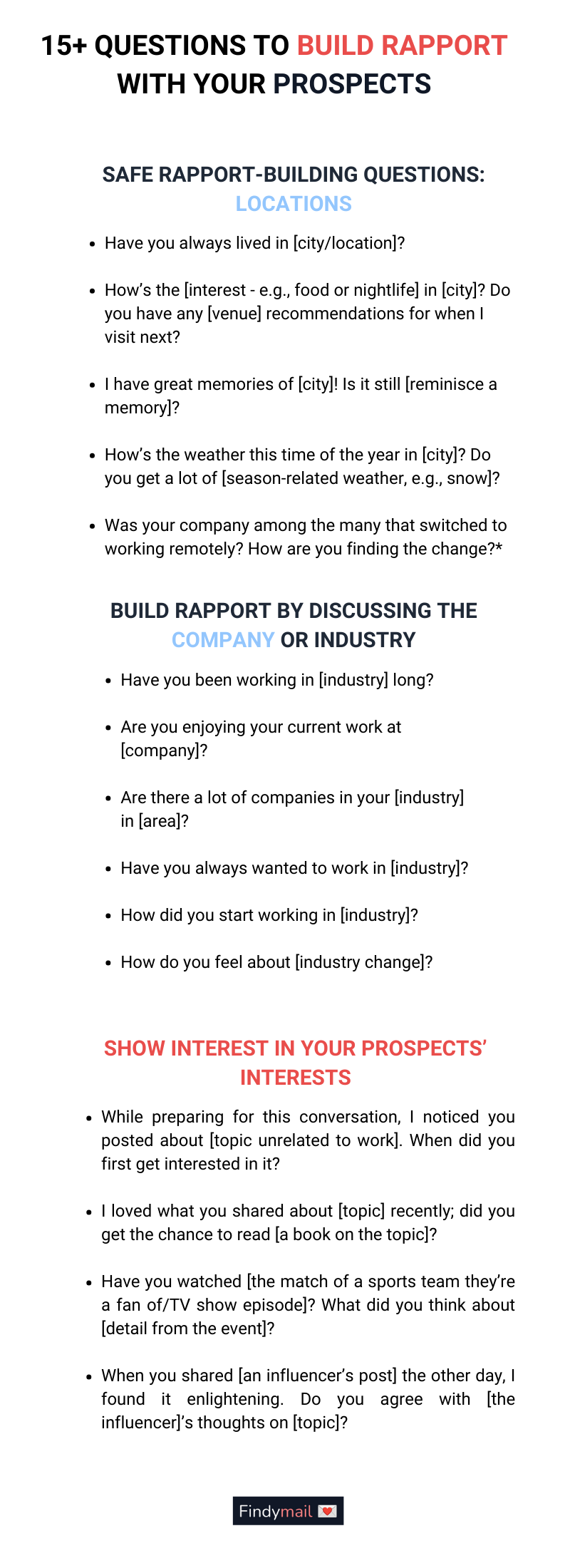Unless highly extroverted, most prospects won’t want to talk to someone they don’t know. The problem is that you have minimal time to get them to trust you, so you can successfully resolve their problem with your product.
So today, I’ll explain the key to successfully building rapport in sales and show you the best questions you can use to create a connection with your prospects.
Let’s dive in!
The Art of Posing the Right Rapport-Building Questions

Before you dive into testing different rapport-building questions, you should understand why they’re necessary in the first place. Does a conversation about the weather really have a place in a sales conversation?
Yes - especially during a cold (and even a warm) call.
Maybe you noticed that people don’t like talking to strangers. Rapport makes the conversations flow more freely, so your prospects can open up about their struggles, pain points, and the goals they dream of achieving.
Establishing rapport will even make them more honest with you, especially when it comes to their objections.
The Building Blocks of a Good Rapport-Building Question
The best rapport-building questions (especially in sales) are:
- Well-researched and personal - There’s no substitute for robust prospecting and research. Understand what the lead is interested in, look at their blog and social media (especially LinkedIn), and find some common ground. For example, you could look for alumni on LinkedIn.
- Relevant - Don’t use a generic ice-breaker question like “What do you like to do for fun?” as it can come off as forced. Instead, make the question relevant to something about the prospect or their work.
- Open-ended - The goal is to get the prospect talking about things they have positive emotions about. Avoid questions that allow them to respond with “Yes” or “No.”
Even if your sales pipeline is too crowded to pay everyone equal attention, try to meet them halfway with questions about their location or work-related interests.
How to Pose Questions
If you’ve ever been on a call where someone asked you - “So, [NAME], where are you based?” - it was a segue into a rapport-building question. Let time pass between the initial greeting and the question, as you don’t want the question to sound forced and posed with an agenda.
Similarly, don’t gloss over the prospect’s response. Instead, give them time to respond and use active listening to engage in a brief conversation.
Be mindful of your body language. Appear open and interested, giving them physical cues to keep going by nodding or smiling.
Sometimes, a prospect may be uncomfortable with a question - even if it isn’t too personal or controversial. Don’t try to make a connection happen; instead, switch gears and move on to a topic they might be more comfortable with. For example, switch from talking about their city to recent company news.
With that said, you’re ready to start building rapport!
The Best Questions for Building Rapport
1. Safe Rapport-Building Questions: Locations
Even if you haven’t done extensive lead research, you can find common ground by asking about their area or daily conditions. There’s nothing people like more than ranting about the commute (if not WFH-ing). Plus, areas are literally common ground; prospects are familiar with them, and the questions about their locations will put them at ease.
- Have you always lived in [city/location]?
- How’s the [interest - e.g., food or nightlife] in [city]? Do you have any [venue] recommendations for when I visit next?
- I have great memories of [city]! Is it still [reminisce a memory]?
- How’s the weather this time of the year in [city]? Do you get a lot of [season-related weather, e.g., snow]?
- Was your company among the many that switched to working remotely? How are you finding the change?*
* You can also ask the prospect if they’re affected by current situations, from local things to global shifts like the pandemic or energy crisis.
2. Build Rapport by Discussing the Company or Industry
If your prospects prefer to jump straight to business (or you haven’t done extensive research), break the ice and start building trust by asking about their company or industry:
- Have you been working in [industry] long?
- Are you enjoying your current work in [company]?
- Are there a lot of companies in your [industry] in [area]?
- Have you always wanted to work in [industry]?
- How did you start working in [industry]?
- How do you feel about [industry change]?
Industry-related questions are great as a segue into posing a high-value B2B buyer question related to the needs your product can solve.
Of course, it helps if you explore the prospect’s LinkedIn profile (or perhaps even get their email address from LinkedIn) so you understand their career journey better. This would unlock questions such as:
- I noticed you have [unrelated skill] listed on your LinkedIn as a skill! How did you develop an interest in it?
- A few of my friends are [school] alumni! They loved going there; what was your experience like?
- Was [certification listed on their LinkedIn] helpful? I’ve been thinking of getting certified myself, and I’d love to hear if you thought it was worth it.
- Do you often go to [a popular industry conference]?
3. Show an Interest in Your Prospects’ Interests
Pay attention to what your prospects share on social media; are they fans of a particular band, sports team, or TV show?
Similarly, understand whose posts they share the most. If they follow specific influencers and agree with their ideas about life or work, that’s an excellent conversation starter!
- While preparing for this conversation, I noticed you posted about [topic unrelated to work]. When did you first get interested in it?
- I loved what you shared about [topic] recently; did you get the chance to read [a book on the topic]?
- Have you watched [the match of a sports team they’re a fan of/TV show episode]? What did you think about [detail from the event]?
- When you shared [an influencer’s post] the other day, I found it enlightening. Do you agree with [the influencer]’s thoughts on [topic]?
Even if you don’t share the same interests, you can always angle the question toward wanting to learn more about the subject.
Keep an Open Mind and Start Building Relationships
Know who your prospect is as a person before you pick up the phone. Even though your goal is to show them how they can succeed with the help of your company, remember that you’re always talking to people first - and professionals second.
Help them build trust in you, nurture the relationship, and soon enough, you won’t just be getting sales - you’ll be getting up-sells and connections for life.






